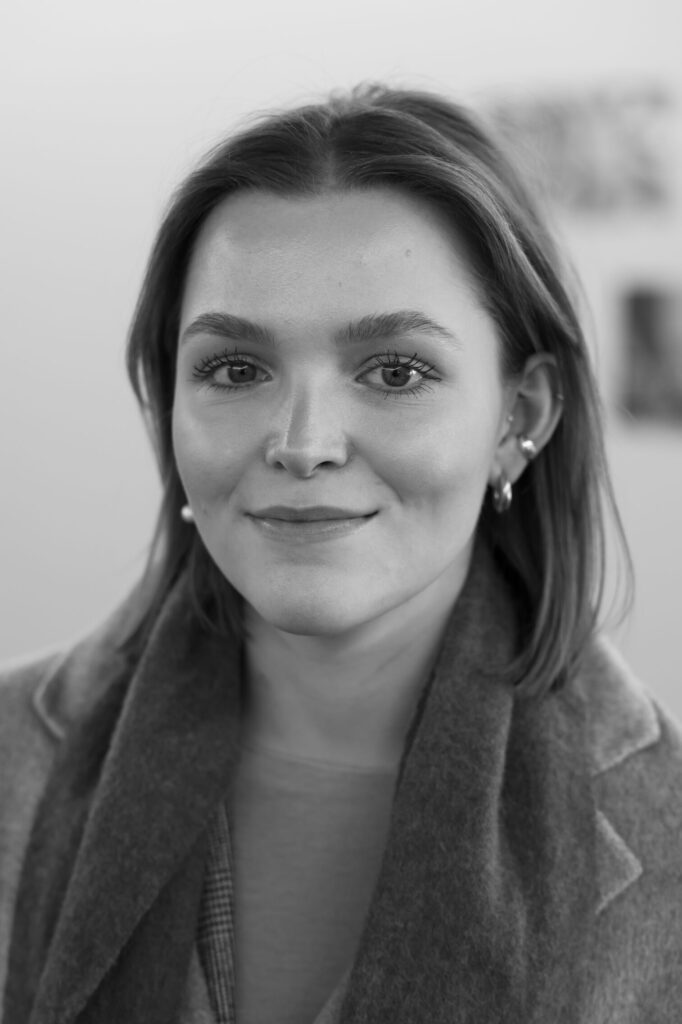Research Fellow

Lilli Kim Schreiber
ليلي كيم شرايبر
Lilli Kim Schreiber (born in Basel, Switzerland) is a researcher, journalist, and curator focusing on the intersection of artistic practice, research, and cultural mediation. She specializes in the sociology of the art field, alternative curatorial practices, and collective approaches to artistic and research processes.
Lilli Kim Schreiber grew up in Switzerland, where she completed her federal matura before pursuing a Bachelor’s degree in Cultural Management at Zeppelin University, Germany. Her academic focus lies in cultural studies and the sociology of art. In 2024, she studied at Sciences Po in Reims, France.
With a background in journalism, Lilli Kim Schreiber regularly contributes to Saiten magazine, critically engaging with visual arts, theater, and opera. Her current research examines the institutional framing of Pierre Bourdieu’s Algeria Photographies in international exhibitions between 2003 and 2025, offering a critical examination of decolonial narratives and the use of photography at the intersection of visual sociology and artistic practice.
Lilli Kim Schreiber also has extensive experience in cultural programming and curatorial practice. She served as artistic director of the Seekult Arts and Community Festival in Friedrichshafen and is co-editor of the upcoming publication Fluid Spaces: Curating Decentralities (2025). Her international collaborations include work with the Goethe-Institut and the Arab-German Young Academy of Sciences and Humanities (AGYA) in Cairo, focusing on cultural mediation and knowledge transfer. Her work bridges cultural policy, artistic practice, and institutional critique, with a focus on international and transcultural collaborations.
As an independent curator, she organized a digital poetry exhibition at Literaturhaus Vorarlberg and currently works as a research assistant at Zeppelin University, supporting a DFG-funded visual anthropology project on Pierre Bourdieu’s Revue Actes de la Recherche en Sciences Sociales. Lilli Kim Schreiber also contributed to the publication Decolonial Cultural Practices: Towards Pluriversal Cultural Institutions and Policies (Routledge, 2024), where she explores the shift in the curator’s role triggered by the debate surrounding ruangrupa’s curatorial work at documenta fifteen.
Related Media
Bahman Iranpour Julian Kraemer Lilli Kim Schreiber Meriam Bettouhami
Publication: Collectivise
-
Research Project
Video-Podcast: A Dialogue Between Egypt’s and Tunisia’s Music Scenes
-
Research Project
Exploring Cairo’s Underground Art Scene: Stories of Resilience and Artistic Resistance
-
Research Project
collectivise (culture)
mapping collaborative practices in arts and culture -
Research Project
Artists in Society
Film-Portraits from Tunis -
Research Project
‘Places in the In-Between’
An Exhibition -
Research Project
‘Places in the In-Between’
An Exhibition -
Research Project
‘Places in the In-Between’
An Exhibition -
Research Project
collectivise (culture)
mapping collaborative practices in arts and culture -
Research Project
Video-Podcast: A Dialogue Between Egypt’s and Tunisia’s Music Scenes
-
Research Project
Exploring Cairo’s Underground Art Scene: Stories of Resilience and Artistic Resistance
-
Research Project
Artists in Society
Film-Portraits from Tunis -
Research Project
collectivise (culture)
mapping collaborative practices in arts and culture -
Research Project
Exploring Cairo’s Underground Art Scene: Stories of Resilience and Artistic Resistance